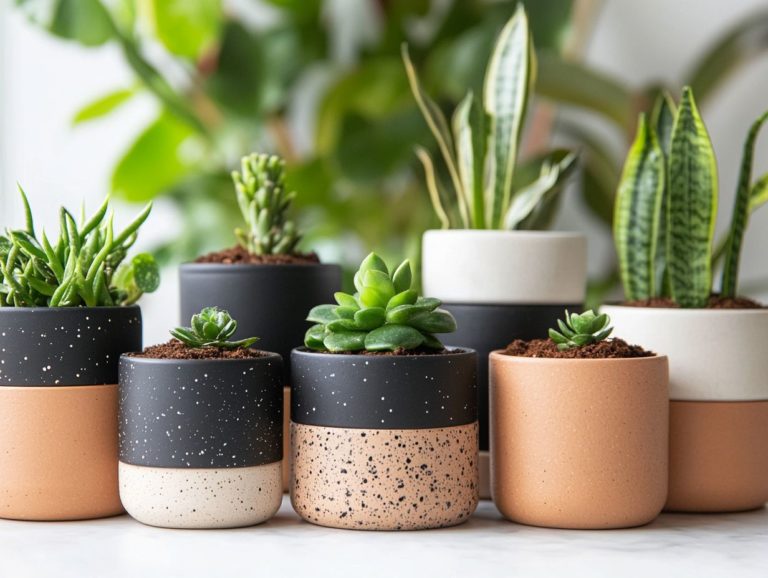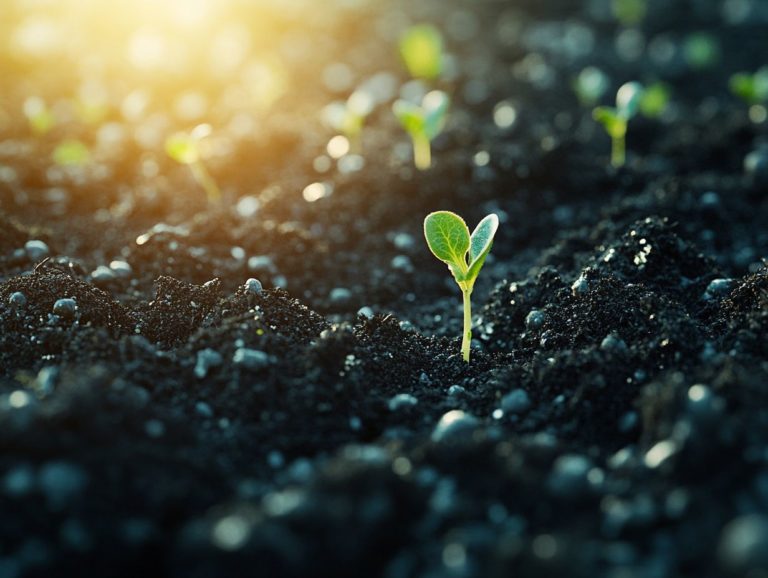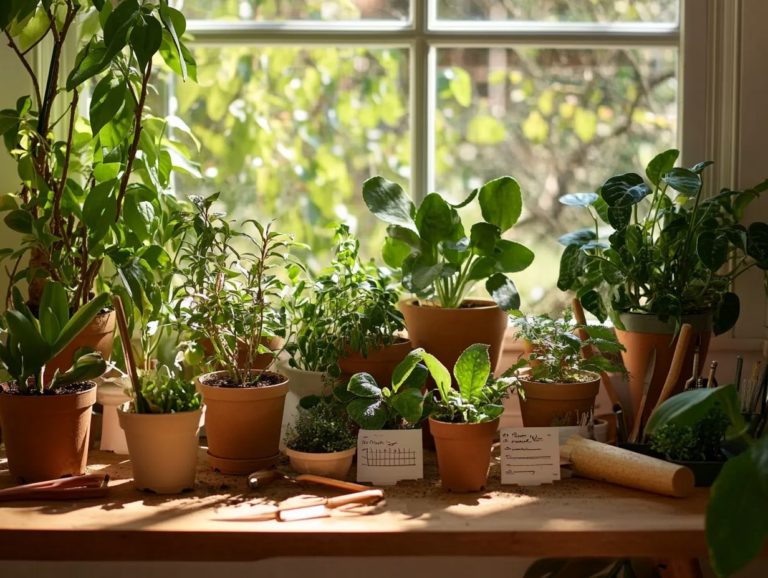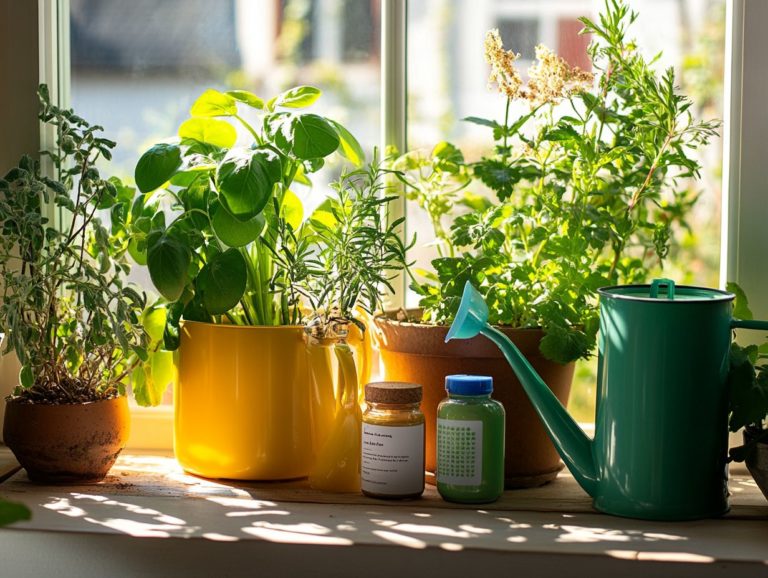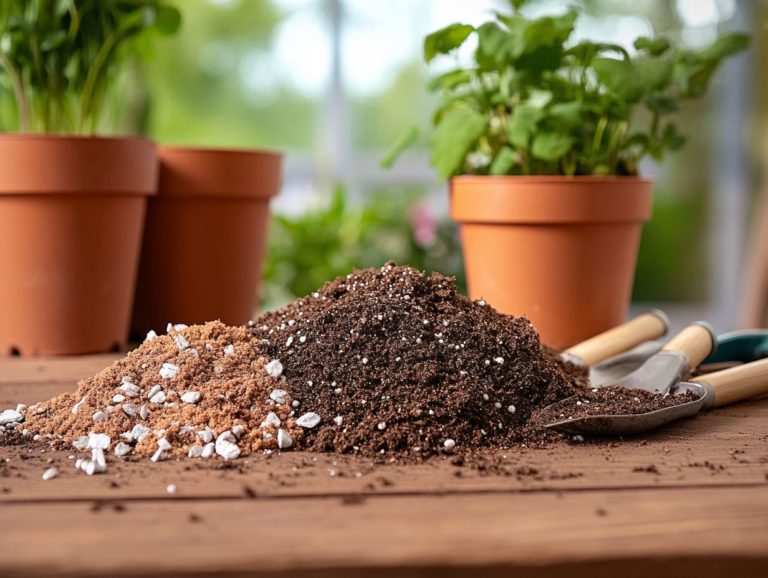Types of Fertilizers: Which Is Right for You?
Fertilizers are essential for nurturing plants and maximizing crop yields, yet the world of fertilizers can feel daunting. This article simplifies the essentials of fertilizers, exploring what they are, how they work, and the various types at your disposal both organic and synthetic.
It will assist you in selecting the perfect fertilizer for your garden or farm, provide effective application techniques, and dispel common myths surrounding this vital topic. Get ready to transform your gardening success today!
Contents
- Key Takeaways:
- Understanding Fertilizers
- Types of Fertilizers
- Choosing the Right Fertilizer for Your Needs
- How to Use Fertilizers Effectively
- Common Misconceptions About Fertilizers
- Frequently Asked Questions
- What are the different types of fertilizers available?
- Which type of fertilizer is right for my plants?
- Are organic fertilizers better for the environment?
- Do I need to use different types of fertilizers for different plants?
- What are the benefits of using slow-release fertilizers?
- Can I make my own organic fertilizer at home?
Key Takeaways:
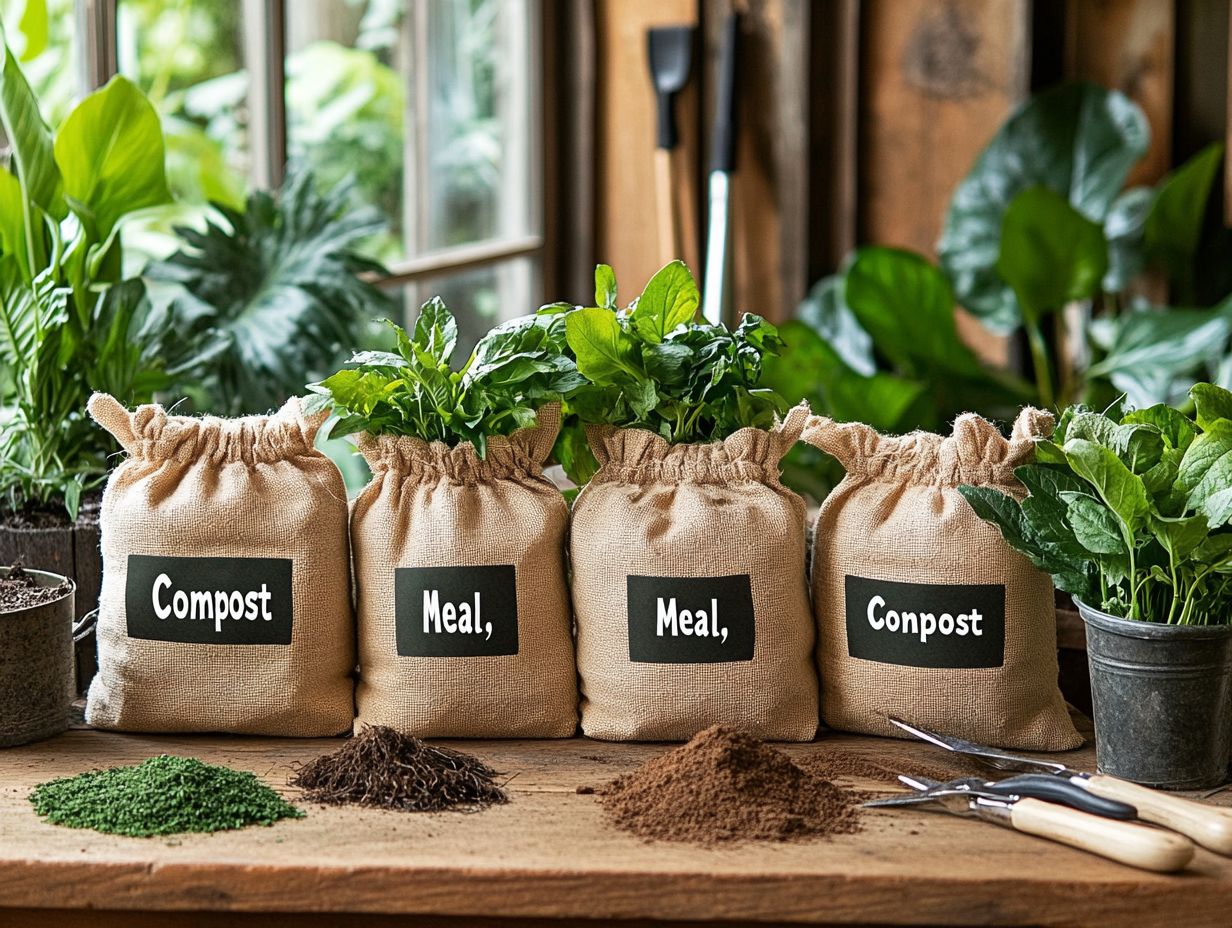
- Organic or synthetic? Consider your plant’s needs and environmental impact before choosing a fertilizer.
- Proper application is crucial for fertilizer effectiveness. Follow instructions and use the right amount for your specific plant and soil type.
- Don’t fall for common misconceptions about fertilizers. Do your research and debunk myths to make informed choices for your plants.
Understanding Fertilizers
Understanding fertilizers is essential for managing crops effectively, as they play a crucial role in fulfilling the nutrient needs of various plants throughout their growth cycles. You can categorize these substances into organic and inorganic types, each contributing uniquely to enhancing soil quality and overall plant health.
With advancements in agricultural technology, precision farming techniques are now at your fingertips. These techniques enable you to optimize fertilizer use for improved crop yields while minimizing environmental impact.
What are Fertilizers and How Do They Work?
Fertilizers are essential substances that provide crucial nutrients to plants. They boost growth and productivity by enhancing nutrient absorption through the soil and roots.
These vital inputs can be categorized into chemical and organic types, each possessing unique properties and effects on soil health and crop yield. Chemical fertilizers, typically abundant in nitrogen, phosphorus, and potassium, work swiftly to remedy nutrient deficiencies and foster rapid growth during key development phases. However, it’s important to note that excessive use can lead to soil degradation and nutrient imbalances.
In contrast, organic fertilizers like compost or manure release nutrients gradually. This improves soil structure and stimulates microbial activity, creating a balanced ecosystem that nurtures sustainable plant health over time. By grasping these distinctions, you can make informed decisions that will elevate your agricultural practices to new heights.
Types of Fertilizers
Fertilizers are available in a range of forms, primarily divided into inorganic and organic categories. Each type is meticulously crafted to fulfill the specific nutrient needs of crops, providing essential elements such as nitrogen, phosphorus, potassium, and crucial micronutrients.
Organic Fertilizers
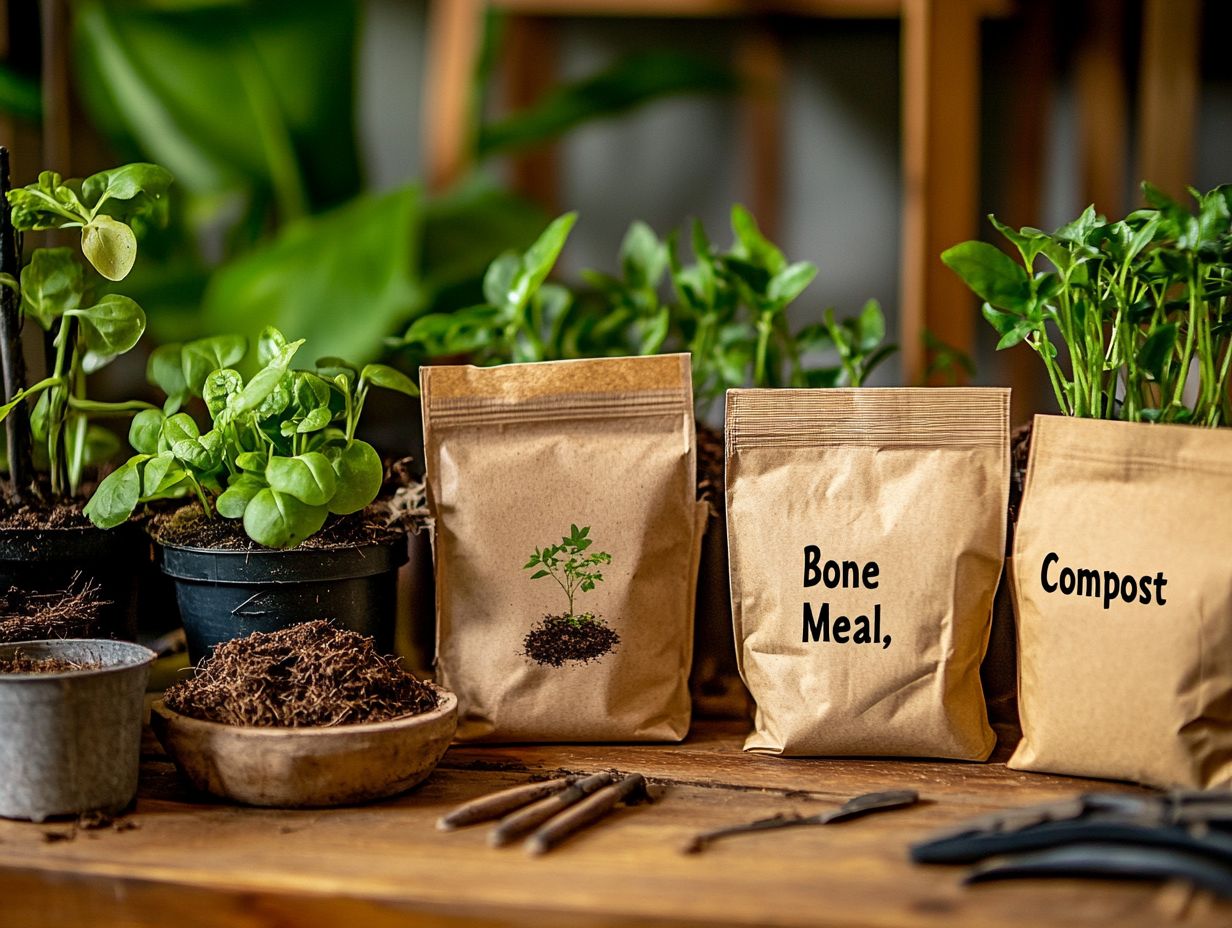
Organic fertilizers, sourced from nature’s bounty think compost, blood meal, and bone meal are your allies in promoting soil health. They elevate microbial activity and offer a slow-release nutrient supply, which is essential for sustainable agriculture.
These eco-friendly alternatives are instrumental in enhancing soil structure, boosting its water retention capacity, and mitigating erosion. By nurturing a diverse community of beneficial microorganisms, organic fertilizers like Milorganite enable your plants to absorb nutrients more effectively, allowing them to flourish.
These fertilizers also optimize nutrient cycling within the soil, ensuring that vital elements like nitrogen, phosphorus, and potassium remain accessible for extended periods. This not only fosters healthier plants but also supports sustainable farming practices, reducing dependence on chemical inputs and minimizing your environmental footprint.
Have you tried organic fertilizers yet? Why wait? Start your gardening adventure with the right fertilizer today!
Synthetic Fertilizers
Synthetic fertilizers, often referred to as inorganic fertilizers, are packed with concentrated nutrients like nitrogen, phosphorus, and potassium, commonly known by their NPK ratio. They re crafted for quick absorption, making them essential for modern agriculture.
These fertilizers serve as a vital tool in your farming toolkit. They offer a swift and effective remedy for nutrient deficiencies in the soil. With their high nutrient concentration, you can achieve impressive yields. This allows your plants to thrive in record time.
Among the various options at your disposal, controlled-release fertilizers or fertilizers that release nutrients slowly over time stand out with their unique design. This feature is particularly beneficial, as it helps prevent fertilizer burn, which can damage delicate plant roots.
By stabilizing nutrient levels, these fertilizers maintain an optimal balance in the soil. This creates a healthier growing environment and maximizes nutrient efficiency for your crops.
Choosing the Right Fertilizer for Your Needs
Selecting the perfect fertilizer for your unique needs requires a nuanced understanding of your crops’ nutrient requirements. Conduct comprehensive soil testing to consider the specific type of crop you’re working with and its current growth stage.
This thoughtful approach ensures that your plants receive precisely what they need to flourish.
Factors to Consider
When selecting fertilizers, consider various factors, including soil quality, potential nutrient deficiencies, and the environmental impact of your agricultural practices. This careful consideration is key to ensuring sustainable agriculture.
Soil quality is fundamental in determining the nutrients available to your crops. It significantly influences overall yield. Healthy, nutrient-rich soil can drastically reduce the need for synthetic fertilizers, creating a more sustainable agricultural environment.
Assessing soil pH and texture is also important. These characteristics determine how effectively your plants can access nutrients. You can minimize environmental impact by adopting strategies such as crop rotation, cover cropping, and integrated pest management.
Promoting biodiversity and enhancing soil health support fertility and create resilient ecosystems. This safeguards both your current and future agricultural productivity.
How to Use Fertilizers Effectively
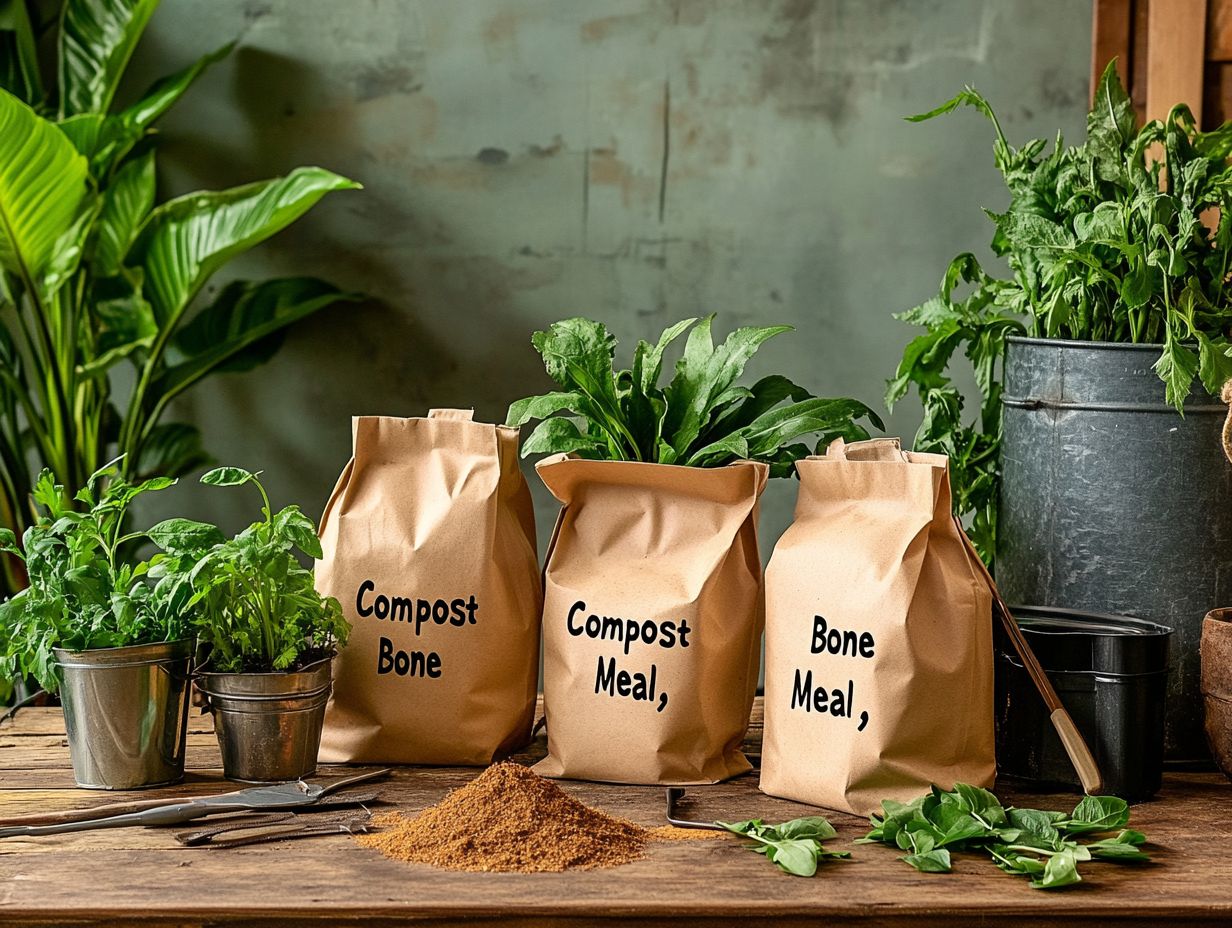
To effectively utilize fertilizers, employ proper application techniques that optimize nutrient absorption while minimizing waste and reducing environmental impact.
Advances in agricultural technology can greatly facilitate this process, ensuring that you achieve the best possible results.
Proper Application Techniques
Proper application techniques are crucial for maximizing nutrient absorption and minimizing the environmental impact of fertilizers in your crop management efforts.
Understanding methods such as broadcasting, where fertilizers are evenly spread across the soil, or banding, which strategically places nutrients in the root zone, can significantly influence plant growth.
Fertigation, the practice of delivering fertilizers through irrigation systems, allows you to manage nutrients precisely. This ensures your crops receive exactly what they need when they need it.
Timing is everything. Applying nutrients at the right growth stage enhances uptake, while sticking to the recommended dosage prevents over-application that can lead to runoff. By carefully monitoring and adjusting these practices, you can achieve optimal results and foster sustainable agricultural methods.
Common Misconceptions About Fertilizers
Common misconceptions about fertilizers, especially concerning chemical and organic varieties, may lead you to misunderstand their critical roles in nutrient supply and sustainable agricultural practices. It’s essential to recognize the nuances between these two types to make informed decisions that benefit both your crops and the environment.
Don’t wait to test your soil; understanding its needs can transform your harvest!
Debunking Myths and Misinformation
Debunking myths and misinformation about fertilizers is essential for fostering informed agricultural practices. By understanding the advantages of both chemical and organic fertilizers, we can appreciate their roles better.
Many farmers and consumers often cling to misconceptions that can lead to ineffective practices or unwarranted anxieties. For instance, a prevalent belief exists that all chemical fertilizers are harmful to the environment, neglecting the impressive advancements in production techniques designed to minimize those impacts.
Conversely, organic fertilizers are sometimes mistakenly viewed as a universal solution, overlooking their limitations in nutrient availability. Cultivating a balanced understanding of these fertilization methods enables you to adopt more sustainable agricultural practices.
This understanding allows you to choose the most effective approach for your specific crops, considering both immediate needs and the long-term health of the agricultural ecosystem.
Frequently Asked Questions
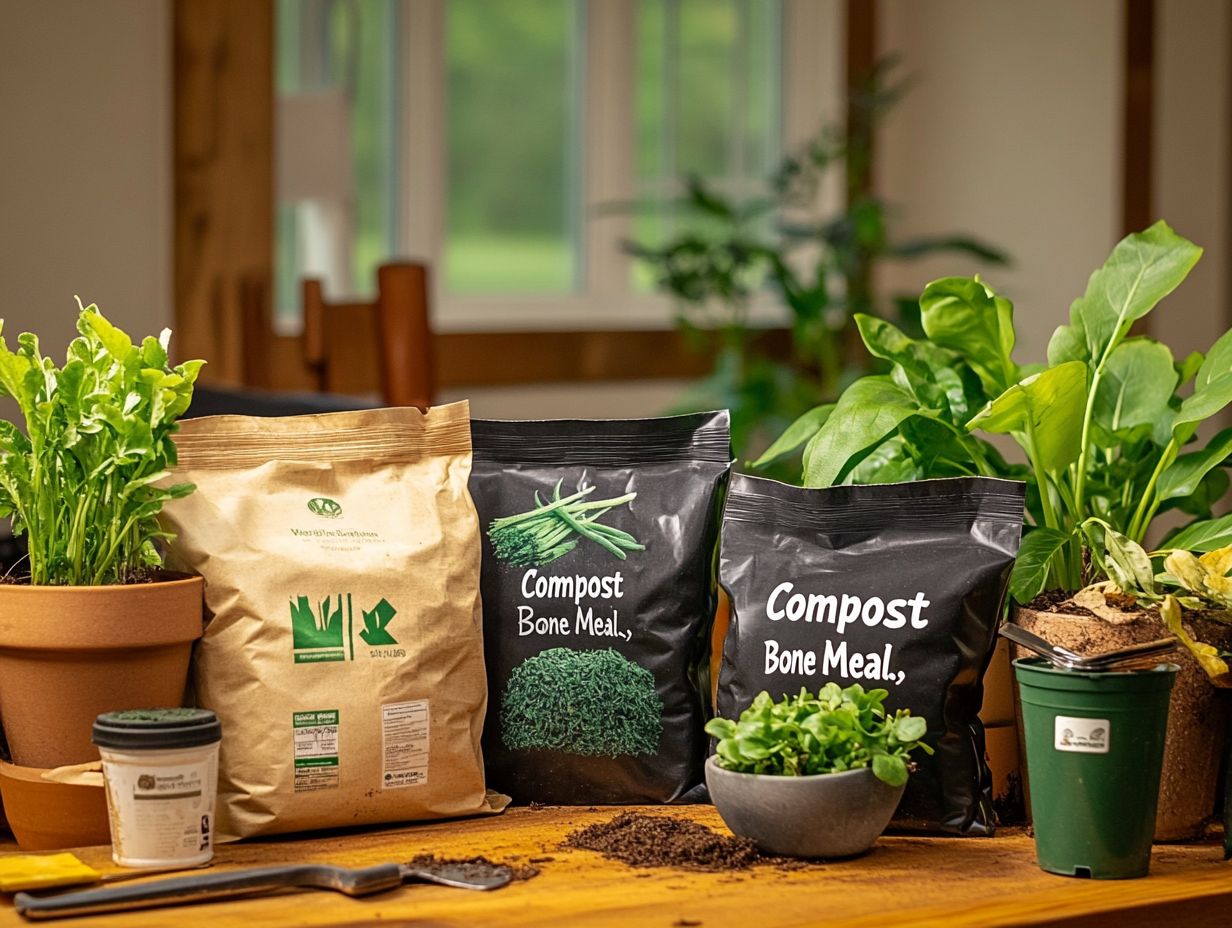
What are the different types of fertilizers available?
There are three main types of fertilizers: organic, man-made, and slow-release. Organic fertilizers are made from natural materials, man-made fertilizers are chemically produced, and slow-release fertilizers release nutrients over a longer period.
Which type of fertilizer is right for my plants?
The best fertilizer for your plants depends on their specific needs. Organic fertilizers promote overall plant health and soil quality, while man-made fertilizers target specific nutrient deficiencies. Slow-release fertilizers are ideal for long-term feeding and can reduce the risk of over-fertilization.
Are organic fertilizers better for the environment?
Organic fertilizers are better for the environment as they are made from natural and sustainable materials. They also improve soil health and reduce the risk of water pollution.
Do I need to use different types of fertilizers for different plants?
Yes, different plants have unique nutrient needs, so using the appropriate fertilizer for each type is crucial. For example, fruit trees may require more nitrogen, while flowering plants might need more phosphorus.
What are the benefits of using slow-release fertilizers?
Slow-release fertilizers offer numerous benefits, such as reducing the risk of over-fertilization, providing a longer-lasting nutrient supply, and improving soil structure. They also require less frequent applications, making them convenient for busy gardeners.
Can I make my own organic fertilizer at home?
You can create your own organic fertilizer at home using ingredients like compost, manure, and food scraps. This approach is cost-effective and a great way to reduce waste while enhancing the health of your plants and soil.
Get started on your gardening journey today! Experiment with different fertilizers and see how they can transform your plants.

